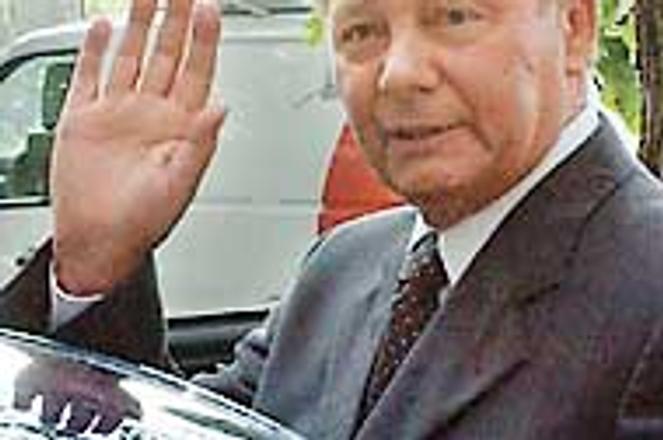PRESIDENT Schuster waves to onlookers as he departs for a Vienna hospital.photo: TASR
PRESIDENT Rudolf Schuster was taken to a Vienna hospital on August 27 after top Slovak doctors admitted they had been stymied by the head of state's mysterious week-long illness.
Schuster, who underwent a series of operations in Austria's Innsbruck two years ago to treat a ruptured colon, was first admitted to Bratislava's Military Hospital on August 22 with a high fever.
After blood tests and intense diagnostic efforts failed to identify the cause of the president's illness, however, Schuster accepted an offer from Austrian President Thomas Klestil to seek treatment at Vienna's AHK General Hospital.
In the Austrian capital Schuster underwent a further series of tests, with Dr Wolfgang Graninger of the hospital's infection and chemotherapy department suggesting that the cause of Schuster's illness was an infection.
Before leaving, Schuster said several times through his spokesman Ján Fule that he was "happy with Slovak doctors", but domestic critics grumbled that the president's move reflected his lack of faith in his own country's health care.
Schuster almost died two years ago after Slovak doctors failed to properly diagnose or treat his ruptured colon. Following a bizarre series of incidents which culminated in a comatose Schuster being locked out of a Bratislava hospital, police laid charges against members of his treatment team. The case remains under investigation.
While Vienna's Graninger praised the recent work of his Slovak colleagues, some politicians said Schuster's decision could endanger confidence in Slovak doctors.
"In extreme cases, will we have 5.5 million Slovaks travelling to seek cures abroad every time they find themselves unhappy with the pace or progress of treatment at home?" asked former Health Minister Tibor Šagát, who resigned after Schuster's botched treatment in 2000.
Štefan Zelník, a health expert with the opposition Real Slovak National Party, said he was sorry that Schuster "is creating such an image of Slovak health care".
Two days after Schuster's original hospitalisation on August 22 Slovak doctors released the president, thinking his health had improved and that he had recovered from what they believed to be cause of his fever - the sunstroke he had suffered while attending a papal mass in the Polish city of Krakow August 21.
But after the president's temperature rose to 39.3 Celsius a few hours later, he was taken back to the Military Hospital.
Slovak doctors had been looking into three potential causes of the president's illness - gallbladder trouble, a viral infection or food poisoning.
Although the latter seemed the least likely, given that the president's security team checks all food the president eats, Schuster's family seized on a test which indicated the presence of toxic substances in Schuster's blood.
Peter Schuster, the president's son, filed a criminal complaint against an unknown perpetrator August 25 shortly after his father's second hospitalisation, forcing authorities to examine the possibility that someone might have tried to poison the president.
"We have no information that someone would want to hurt the president in this way," said František Zemko, head of the Office for the Protection of Constitutional Officials, which oversees the safety of the country's top representatives.
The president's personal physician, Peter Mayer, also said he considered poisoning the least likely cause of Schuster's illness.
The president's fragile condition also focused attention on September's general elections, following which the head of state has the task of naming the country's future prime minister and cabinet, and calling an initial parliamentary session within 30 days of the ballot.
This year's elections are of particular importance for Slovakia, as the composition of the next cabinet is expected to have a decisive impact on the country's admission to Nato and the European Union.
Western diplomats have said that if authoritarian former PM Vladimír Mečiar returns to power this year, Slovakia may not be invited to western alliances. Mečiar's HZDS party has led voter support polls for much of the last decade.
Although doctors are optimistic that Schuster, 68, will be well enough to fulfill his constitutional role, legal experts have said in case Schuster remains indisposed, the speaker of parliament inherits his election-related responsibilities.
At the time of Schuster's admission to the Military Hospital, Slovak doctors were also considering the possibility that mushrooms he had been given by the inhabitants of Ľubietová village could have caused his illness.
Although they later said that the wild mushrooms, some types of which are considered a gourmet dish in Slovakia, were not behind the illness, they have not ruled out the possibility that the president could have ingested poison in his drinking water.
Zemko said that the incident had convinced the president's security team to look more closely into his household arrangements, and to have a hygiene expert accompany the president's wife on her food shopping outings, "to advise her which products are suitable [for the president] and which aren't, and to make sure they are not past the expiry date".

